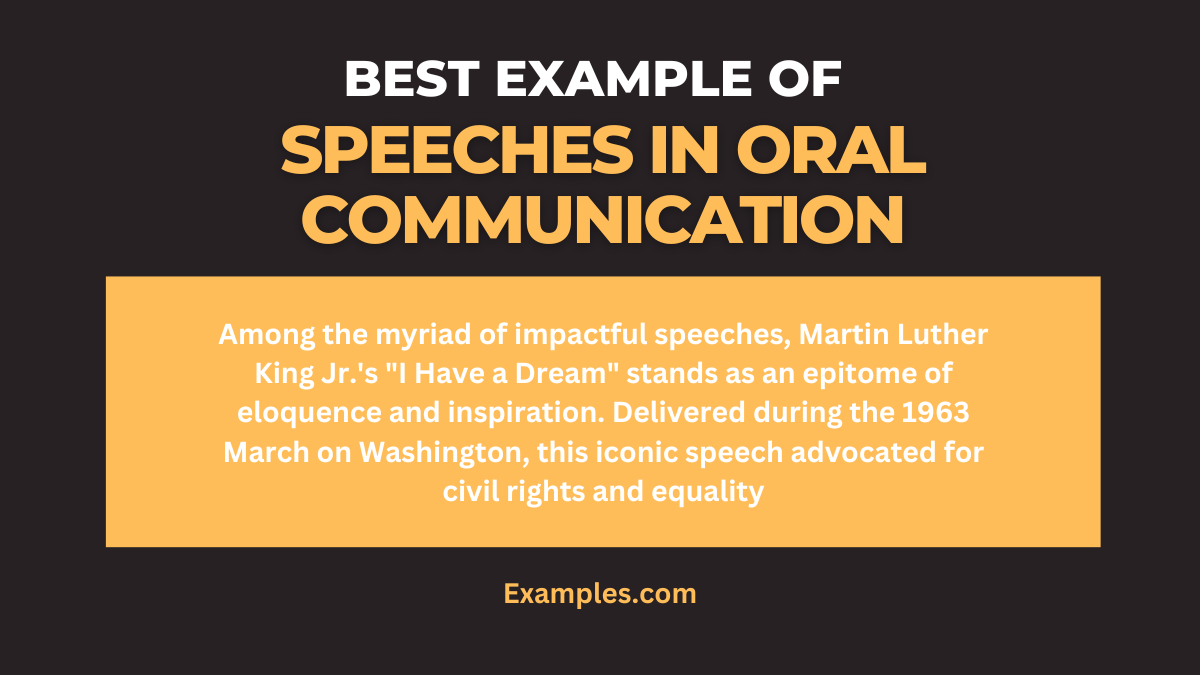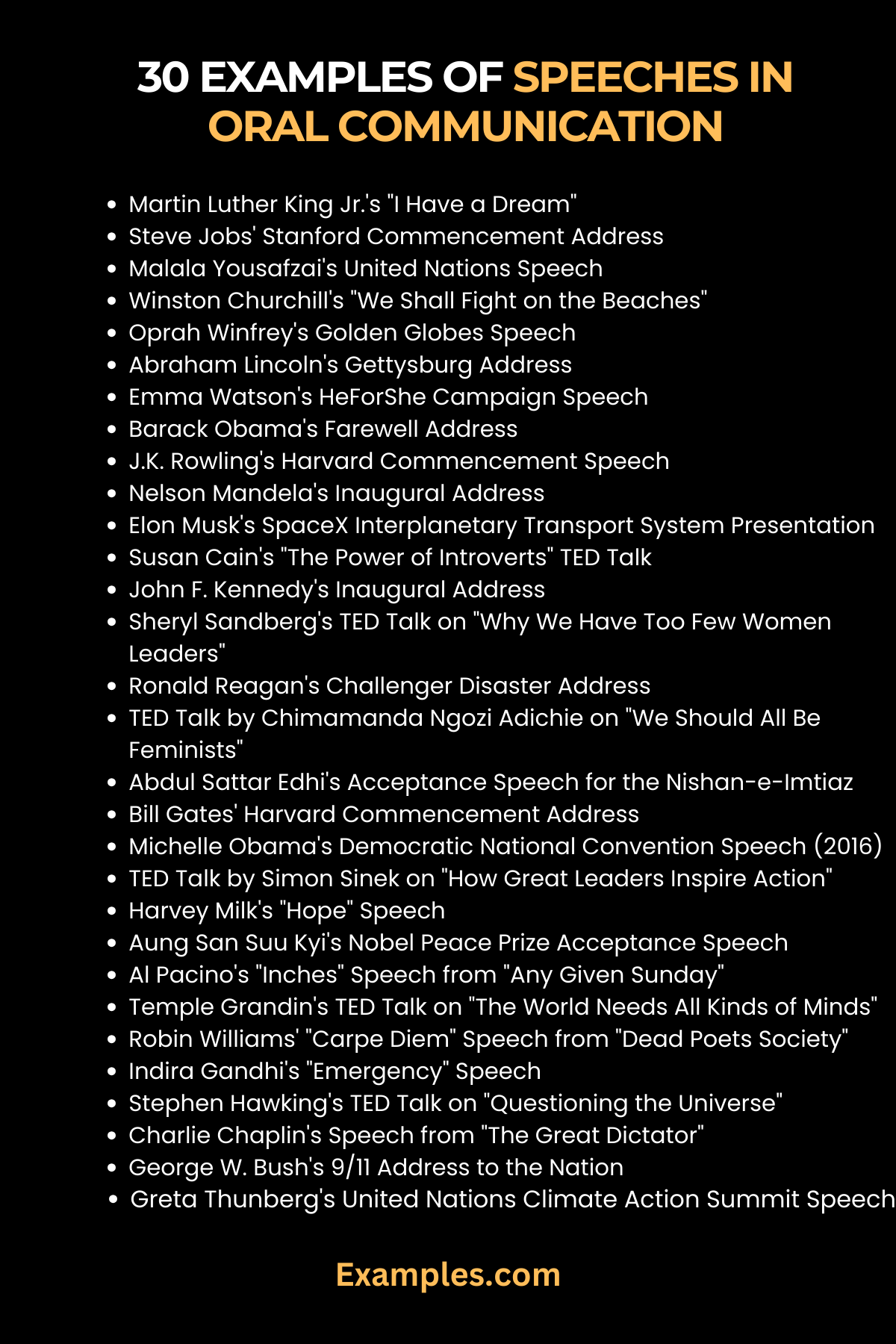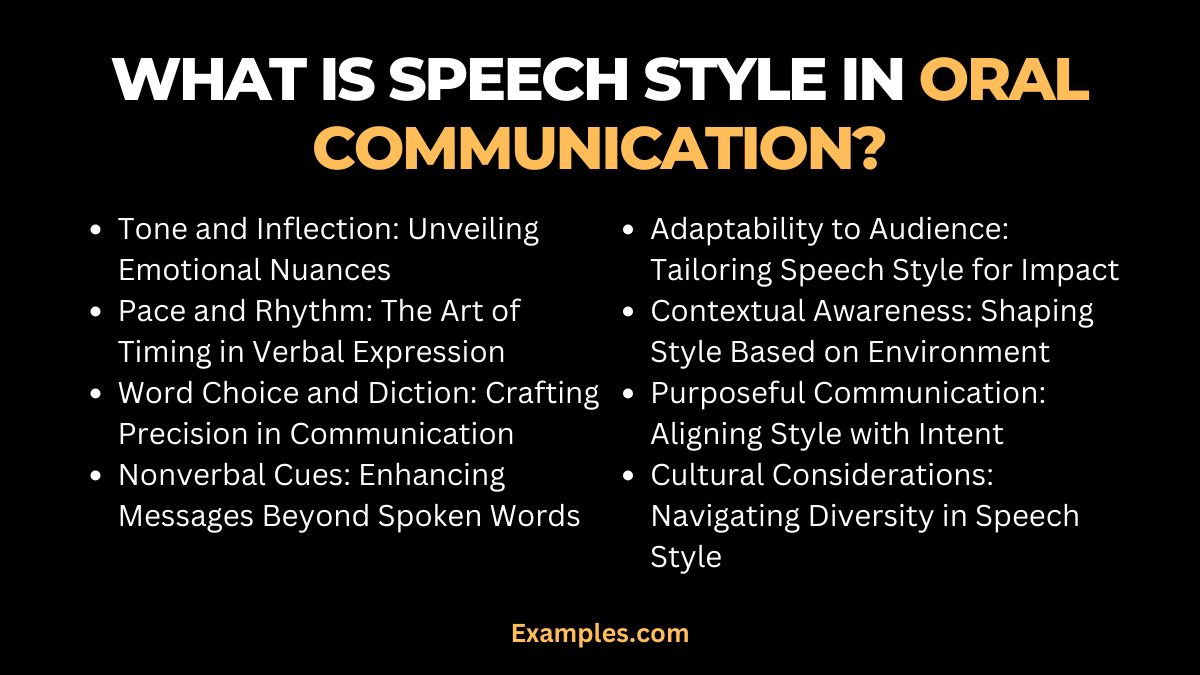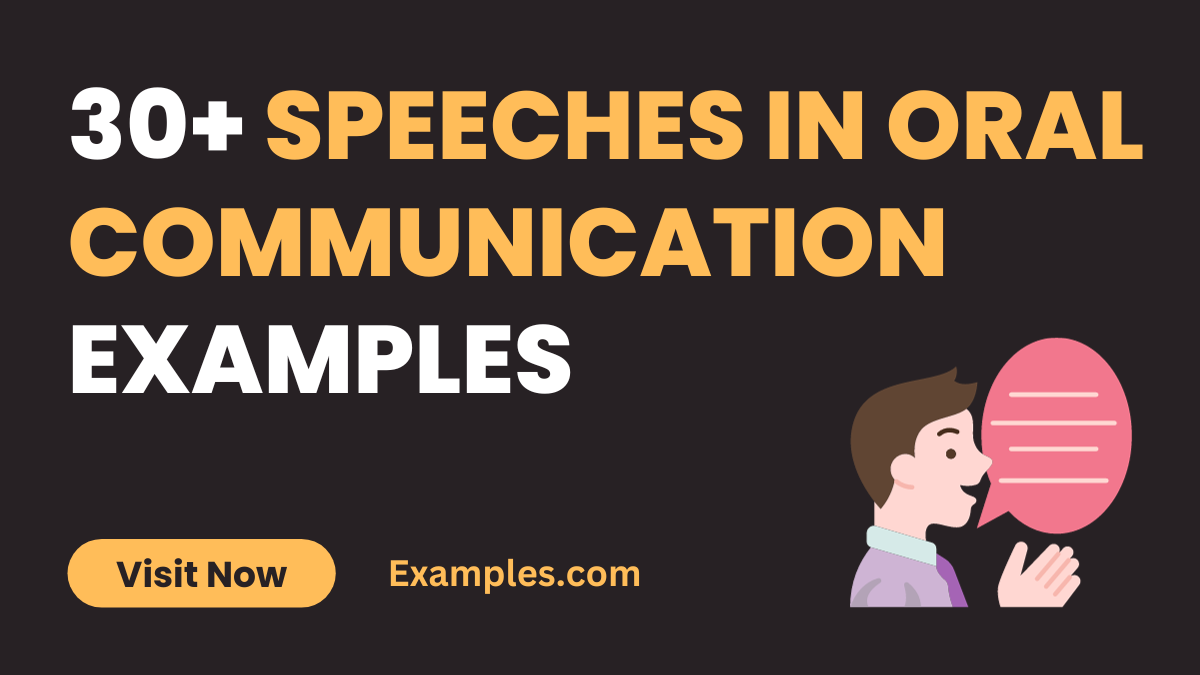Speeches in Oral Communication
Embark on a transformative journey into the realm of Speeches in Oral Communication with our comprehensive guide. Unlock the art of effective communication through enlightening examples that vividly illustrate each principle. From honing your communication skills to navigating various styles, this guide is your key to mastering the craft. Elevate your understanding with real-world Communication Examples, ensuring a seamless blend of theory and practical application in your oral communication endeavours. Dive in for a holistic exploration of impactful speeches and communication strategies.
What are Speeches in Oral Communication
Speeches in Oral Communication encompass verbal expressions designed for effective interpersonal communication. Simply put, they are structured talks delivered orally, aiming to convey information, persuade, or entertain. In essence, these speeches serve as a vital tool in conveying thoughts and ideas directly, fostering a deeper connection between the speaker and the audience. Explore the fundamental definition and significance of Speeches in Oral Communication in this insightful exploration.
Best Example of Speeches in Oral Communication

Among the myriad of impactful speeches, Martin Luther King Jr.’s “I Have a Dream” stands as an epitome of eloquence and inspiration. Delivered during the 1963 March on Washington, this iconic speech advocated for civil rights and equality. King’s masterful use of rhetoric, powerful metaphors, and unwavering passion left an indelible mark, transcending time. This example of Speeches in Oral Communication showcases the profound impact a well-crafted speech can have in shaping history and stirring societal change. Explore the nuances and brilliance of this timeless address.
30 Examples of speeches in Oral Communication
Uncover the richness of effective communication with these 30 Speeches in Oral Communication examples. From historic addresses to modern talks, this diverse collection offers a holistic view of impactful verbal expressions. Elevate your communication skills by studying these instances, each a masterclass in connecting with an audience, navigating various styles, and delivering messages with resonance.

- Martin Luther King Jr.’s “I Have a Dream”: King’s eloquent call for civil rights resonates with timeless power, showcasing the impact of passionate rhetoric.
- Steve Jobs’ Stanford Commencement Address: Jobs’ speech is a testament to the art of storytelling, inspiring graduates with personal anecdotes and wisdom.
- Malala Yousafzai’s United Nations Speech: Malala’s courageous words advocate for education, exemplifying the transformative power of conviction.
- Winston Churchill’s “We Shall Fight on the Beaches”: Churchill’s wartime oration is a model of resilience and leadership in the face of adversity.
- Oprah Winfrey’s Golden Globes Speech: Oprah’s empowering address emphasizes the importance of truth and inclusivity, leaving an indelible mark on her audience.
- Abraham Lincoln’s Gettysburg Address: Lincoln’s succinct yet profound speech memorializes sacrifice and commitment to a united nation.
- Emma Watson’s He For She Campaign Speech: Watson’s advocacy for gender equality showcases the impact of using celebrity influence for a noble cause.
- Barack Obama’s Farewell Address: Obama’s farewell speech combines reflection and hope, offering a compelling narrative for the nation’s future.
- J.K. Rowling’s Harvard Commencement Speech: Rowling’s candid revelations about failure and resilience make for a memorable lesson in life’s challenges.
- Nelson Mandela’s Inaugural Address: Mandela’s speech embraces reconciliation, embodying the spirit of unity and forgiveness.
- Elon Musk’s SpaceX Interplanetary Transport System Presentation: Musk’s visionary talk on interplanetary travel blends technical details with futuristic optimism, showcasing effective communication in complex fields.
- Susan Cain’s “The Power of Introverts” TED Talk: Cain’s speech challenges societal perceptions, emphasizing the strengths of introverted personalities in a world that often celebrates extroversion.
- John F. Kennedy’s Inaugural Address: Kennedy’s iconic speech inspires with its call to civic duty and cooperation, setting the tone for a new era.
- Sheryl Sandberg’s TED Talk on “Why We Have Too Few Women Leaders”: Sandberg’s frank discussion on gender and leadership offers practical insights, making it a landmark in the dialogue on workplace equality.
- Ronald Reagan’s Challenger Disaster Address: Reagan’s empathetic and consoling speech during tragedy showcases the role of leadership in times of crisis.
- TED Talk by Chimamanda Ngozi Adichie on “We Should All Be Feminists”: Adichie’s eloquent advocacy for gender equality serves as a compelling example of using speech to challenge societal norms.
- Abdul Sattar Edhi’s Acceptance Speech for the Nishan-e-Imtiaz: Edhi’s humble and heartfelt speech reflects his dedication to humanitarian causes, leaving a lasting impact on listeners.
- Bill Gates’ Harvard Commencement Address: Gates’ speech combines humour and wisdom, offering valuable insights on success, failure, and the pursuit of knowledge.
- Michelle Obama’s Democratic National Convention Speech (2016): Obama’s emotional and powerful speech emphasizes unity and hope, resonating with a diverse audience.
- TED Talk by Simon Sinek on “How Great Leaders Inspire Action”: Sinek’s Golden Circle concept provides a unique perspective on effective communication, urging leaders to start with “why.”
- Harvey Milk’s “Hope” Speech: Milk’s historic address advocates for LGBTQ+ rights with a message of hope and solidarity, showcasing the power of conviction.
- Aung San Suu Kyi’s Nobel Peace Prize Acceptance Speech: Suu Kyi’s graceful and composed speech underlines the importance of nonviolent resistance and human rights.
- Al Pacino’s “Inches” Speech from “Any Given Sunday”: Pacino’s impassioned locker room speech illustrates the importance of determination and teamwork in the face of challenges.
- Temple Grandin’s TED Talk on “The World Needs All Kinds of Minds”: Grandin’s speech demystifies autism, fostering understanding and acceptance through her personal experiences.
- Robin Williams’ “Carpe Diem” Speech from “Dead Poets Society”: Williams’ portrayal of a teacher inspires students to seize the day and embrace individuality.
- Indira Gandhi’s “Emergency” Speech: Gandhi’s announcement of a state of emergency demonstrates the complexities of political communication during crises.
- Stephen Hawking’s TED Talk on “Questioning the Universe”: Hawking’s speech combines scientific insight with humour, making complex concepts accessible to a broad audience.
- Charlie Chaplin’s Speech from “The Great Dictator”: Chaplin’s powerful plea for humanity transcends comedy, delivering a timeless message of peace and compassion.
- George W. Bush’s 9/11 Address to the Nation: Bush’s speech during a pivotal moment in history conveys strength, resolve, and a call for unity in the face of adversity.
- Greta Thunberg’s United Nations Climate Action Summit Speech: Thunberg’s passionate address on climate change exemplifies the impact of youth activism and urgency in communication.
Speeches in Oral Communication at Universities
Immerse yourself in the realm of Speeches in Oral Communication at universities, where eloquence meets academia. Navigate the nuances of addressing diverse academic audiences, honing persuasive techniques, and conveying complex ideas with clarity. This guide unravels the art of university-level oration, providing insights into captivating speeches that leave a lasting impact on both students and faculty.
- Professor’s Inaugural Lecture: In university settings, professors often deliver inaugural lectures, setting the tone for their academic journey. A well-crafted speech here outlines their research focus and educational philosophy.
- Student Council Election Speech: Student leaders use these speeches to articulate their vision, showcasing their communication skills and persuading peers to entrust them with leadership roles.
- Convocation Address by Guest Speaker: Invited speakers deliver commencement speeches, offering wisdom and inspiration to graduates as they embark on their professional journeys.
- Research Symposium Presentation: Academic conferences feature speeches where researchers present their findings, emphasizing the significance of their contributions to the field.
- Dean’s Welcome Speech: Deans welcome new students, providing insights into the university’s ethos and fostering a sense of community among the academic cohort.
- Alumni Success Story Speech: Alumni share their experiences and accomplishments, motivating current students and illustrating the transformative power of a university education.
- Student Research Showcase: Students present their research projects in speeches, showcasing their investigative skills and contributing to the academic discourse within the university community.
- International Guest Speaker Lecture: Universities often host renowned speakers, enriching the academic environment with diverse perspectives and fostering global awareness.
- Graduate Thesis Défense: Grad students defend their theses in speeches, demonstrating their mastery of the subject matter and engaging with faculty in scholarly dialogue.
- Interdisciplinary Symposium Keynote: Speeches at interdisciplinary events bridge gaps between academic fields, encouraging collaboration and showcasing the interconnectedness of knowledge.
Speeches in Oral Communication for Students
Explore the dynamic landscape of Speeches in Oral Communication tailored specifically for students. From interactive class presentations to extracurricular speeches, this guide illuminates the importance of effective communication in fostering academic growth, personal development, and future success.
- Class Presentation on a Literary Analysis: Students enhance their speaking skills by delivering analyses of literary works, fostering critical thinking and articulation of ideas.
- Debating Club Opening Statement: Engaging in debates sharpens students’ persuasive abilities, allowing them to present compelling arguments and counterpoints.
- Peer Collaboration Workshop Speech: Students lead workshops, demonstrating effective collaboration techniques and emphasizing the value of teamwork.
- Student-led Diversity Forum Address: Speeches in forums cantered on diversity and inclusion empower students to express their perspectives, fostering a more inclusive campus environment.
- Public Speaking Course Final Presentation: Students showcase their progress in public speaking courses by delivering polished and impactful speeches on topics of personal interest.
- Leadership Development Program Speech: Aspiring student leaders share their visions, emphasizing their commitment to enhancing campus life through effective leadership.
- Extracurricular Club Recruitment Pitch: Students hone their persuasive skills by delivering pitches to recruit new members for various clubs and organizations on campus.
- Volunteer Project Reflection Speech: After engaging in community service, students deliver speeches reflecting on their experiences, promoting a culture of civic responsibility.
- Internship Experience Presentation: Students share insights gained from internships, emphasizing the practical application of classroom knowledge in real-world settings.
- Study Abroad Reflection Speech: Those returning from study abroad programs share their transformative experiences, encouraging others to explore diverse cultures for personal and academic growth.
What is Speech Style in Oral Communication?
Speech style in oral communication refers to the unique manner and approach individuals employ when delivering spoken messages. It encompasses a spectrum of elements, including tone, pace, pitch, and choice of words. Understanding the nuances of speech style is pivotal for effective communication, as it directly influences how a message is perceived and received. Let’s delve into the key components that define speech style and explore its significance in various contexts.

- Tone and Inflection:
- The tone of speech reflects the speaker’s attitude and emotional state. Whether it’s assertive, empathetic, or persuasive, the tone sets the overall mood of the communication. Inflection, or variations in pitch, adds dynamism and emphasis to key points.
- Pace and Rhythm:
- The speed at which words are delivered contributes to the overall impact of a message. A well-modulated pace, coupled with a rhythmic flow, enhances listener engagement. Strategic pauses can also emphasize important ideas.
- Word Choice and Diction:
- The selection of words and the precision of diction play a crucial role in conveying the intended message. Whether using formal language for a professional setting or employing colloquial expressions for a casual talk, the choice of words shapes the communication style.
- Nonverbal Cues:
- Nonverbal communication, including gestures, facial expressions, and body language, significantly influences speech style. These cues complement spoken words, adding layers of meaning and aiding in the interpretation of the message.
- Adaptability to Audience:
- Effective speakers tailor their speech style to suit the preferences and understanding of their audience. Adapting to cultural nuances, educational backgrounds, and expectations ensures that the message resonates with listeners.
- Contextual Awareness:
- The context in which a speech occurs greatly influences speech style. Whether it’s a formal presentation, an informal discussion, or a celebratory toast, being attuned to the context allows speakers to strike the right balance in their communication approach.
- Purposeful Communication:
- Speech style is most impactful when aligned with the overarching purpose of communication. Whether aiming to inform, persuade, inspire, or entertain, a purposeful and well-crafted speech style enhances the effectiveness of the message.
- Cultural Considerations:
- Cultural differences can significantly impact speech style preferences. Awareness of cultural norms regarding directness, formality, or informality helps speakers navigate diverse audiences with sensitivity.
In conclusion, the power of speeches in oral communication cannot be overstated. They serve as a conduit for ideas, emotions, and information, influencing audiences and shaping perspectives. For those keen on exploring further, resources like TED Talks offer a vast array of speeches from experts in various fields, providing inspiration and insight into the art of effective communication. Additionally, for practical guidance and skill development, the Toastmasters International website is an invaluable resource for anyone looking to hone their public speaking and leadership skills. These platforms not only provide examples of exceptional speeches but also offer tools and techniques to improve one’s own communication abilities.



